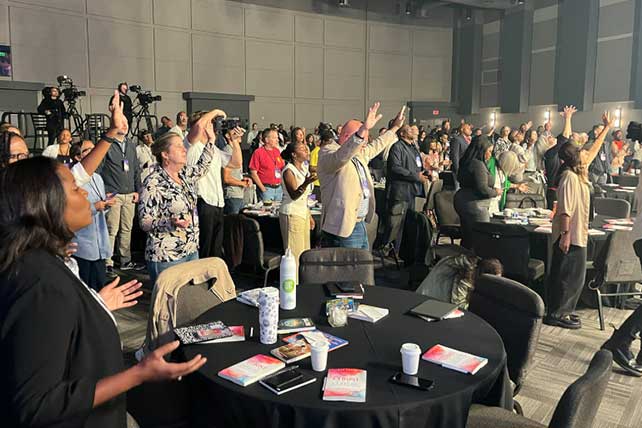NORCROSS, Ga. (RNS) — As Josh Clemons, the executive director of OneRace, an anti-racist Christian organization, kicked off its racial reconciliation conference last week, he compared efforts to clean the church from the sin of racism to an ancient Japanese art practice, kintsugi.
The centuries-old method consists of mending broken pottery by welding pieces with liquid gold. Once repaired, the new ceramics are embellished by shining golden cracks, proudly displaying what were once flaws. Similarly, congregations that reckon with racial divides and engage in bold efforts to dismantle racism in the church end up embellished and more unified, he explained.
“Our racial past is marred and scarred,” Clemons told Religion News Service at the event. “It’s steeped in racism and ethnocentrism and cultural divide. The church is often on the wrong side of that conversation. We believe that the church should show up credibly in these conversations.”
RELATED: 4 Ways To Cultivate Ministry Grit
The Aug. 14 conference, themed “Change the story, redeeming race, reconciliation and the mission of the church,” invited faith leaders to engage in discussions on race, from a gospel-centric perspective.
Five years after George Floyd’s murder at the hands of a Minnesota police officer, which shocked the country and prompted a racial reckoning in American society and the church, much of the conference’s discussions noted how the momentum spurred in 2020 has progressively faded.
In total, 402 faith leaders, from 18 states, attended the event hosted at Norcross’ Victory Church, a megachurch 20 miles north of Atlanta. According to OneRace’s data shared with RNS, 42% of participants were white, 42% Black, 5% Asian and 5% Latino. In panels and small group sessions, guest speakers, including Christianity Today COO Nicole Martin and National Association of Evangelicals President Walter Kim, discussed topics ranging from ways to clear theology from racist bias to the challenges that come with leading multiethnic congregations.
Panels participate in the Change the Story conference, Thursday, Aug. 14, 2025, at Victory Church in Norcross, Ga. (RNS photo/Fiona André)
The political context — as the Trump administration rolls back diversity, equity and inclusion commitments and undermines efforts to teach Black history in schools across the country — was front and center in discussions. As race-related issues become increasingly polarizing, Clemons urged attendees to remain steeped in the work of racial reconciliation and “speak less to foolishness and more to the faithfuls.”
Reminiscing over the support he received from white congregants after Floyd’s murder, Pastor Albert Tate of Fellowship Monrovia in California noted how few voices mounted to denounce current blows at DEI and the erasure attempts of Black history.
“As a Black man, my tears weren’t ignored,” he said of the general reaction to Floyd’s killing. “I didn’t have my white siblings in the Facebook comment section questioning whether it was wrong. We all knew it was wrong. What’s hurtful and discouraging is the silence of my white siblings watching the dismantling and not saying anything.”

Josh Clemons. (Photo courtesy of OneRace)
Still, nearly 10 years after OneRace’s creation and despite the political shifts affecting its efforts, the organization remains dedicated in its attempts to absolve congregations from the sin of racism. The group’s priority, explained the 37-year-old director, is to remain helpful to those still passionate about the cause.
“Are the folks as loud as they once were? Are there as many? No. Have we seen a falling away? Yes. Is that challenging? Yes. But that isn’t a reason for retreating,” Clemons said.
After the morning’s worship concert, Clemons took the stage to lead the attendees in prayer. Seated around tables in the church’s main chapel, participants bowed their heads as he encouraged them to listen with open hearts and minds.
The first panel, about the “11 o’clock hour” still being the most segregated hour in America, a reference to the Rev. Martin Luther King Jr.’s 1960 speech on segregated churches, featured Pastor Lee Jenkins of Eagles Nest Church in Roswell, Georgia; former Fellowship Bible Church Pastor Crawford Loritts, also of Roswell; and World Relief’s Liliana Reza, as well as Martin of Christianity Today and the NEA’s Kim. All shared insights on how racism shows up in theology but also in church life.
As he shared closing remarks, Jenkins, who leads a nondenominational Black church, urged attendees to beware of any theology “that still preaches difference, separation and anxiety.”
Another panel touched on the consequences of initiating discussions about race in churches. Drawing on their own experience, speakers encouraged attendees to become comfortable with ruffling feathers when engaging in racial reconciliation efforts from the pulpit.
OneRace aims to engage faith leaders in such discussions throughout the year. Created amid the 2016 anti-racism protests, the organization seeks to train “reconcilers” or faith leaders trained on race-related issues in their ministry. The trainings, meant for faith leaders and local churches, cover the history of racism in the U.S., the role the church has played in enforcing white supremacy and how to improve racial equity and identify solutions to rid churches of racist bias.


